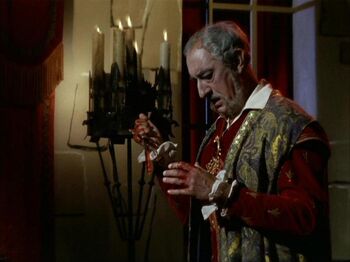Kirk must determine if a Shakespearean actor is the same man as the infamous “Kodos the Executioner,” whose crimes Kirk witnessed 20 years before.

- This is an offbeat, exotic episode, with strong characters and a powerful moral dilemma, that is nevertheless somewhat unsatisfying as a Trek episode – because there’s nothing particularly science-fictional about it.
- The opening scene is striking—we might wonder for a few seconds if we’re watching the right show. (Is this Star Trek?)
- The enhanced graphics, showing the exaggerated curving of the Enterprise orbiting the planet, are getting absurd. Did it not occur to the team doing these enhanced effects realize that this curvature was not the least bit realistic?
- The is a stardate confusion as Kirk interrogates the library computer for background about Kodos. The stardate of this episode is 2817.6, and Kodos was presumably killed 20 years before. Yet the computer begins to say, “On stardate 2794.7, Kodos—“ before Kirk cuts if off. Someone was thinking here that one stardate meant one year, perhaps, rather than one day.
- Do we understand that Kirk comes on to every pretty young woman who crosses his path – or is he being strategic and calculating, as he’s later accused, by playing Lenore along simply to get at her father?
- The exterior of this planet, the sixth or seventh planet we’ve seen so far in the series, is showing production limitations – big lumpy rocks on a surface of sand. The lighting helps, but otherwise, it’s rather threadbare.
- Yeoman Rand is seen for barely a few seconds. This was her last appearance in the show. Originally she had a scene where she interrupted Kirk and Lenore on the observation deck, but the show was running long and the scene was cut.
- Why is McCoy drinking in the middle of the day..?
- The observation deck scene comes very close to the criteria I established early on, in this introductory post. I know that this is one of the dozen episodes I never saw when first run; and I know that in syndicated reruns, this scene was always cut. I had read the scene in Blish’s version, of course. But I think I have seen the scene just once before, when this episode was included among the handful of episodes I bought on DVD (two episodes per disc!) back in about 2000. But that was likely the only time before now that I’ve seen it. Close, but not a scene I’ve *never* seen, as I’m wondering might exist.
- Early drafts of the script had a different crewman, Daiken, as an eyewitness in danger from the Karidian troupe, and consigned to engineering (by the way, why is engineering otherwise so empty?). By final shooting script, he becomes Riley, perhaps because the actor was available again. Yet I wonder if anyone didn’t think of the irony of sending Riley down to engineering, all alone, when it was he who, infected in “The Naked Time”, locked himself in engineering and almost caused the destruction of the ship.
- The episode has a unusual score, by Joseph Mullendore (listed without first name in the credits), quite unlike most of the series music, with some familiar themes in lounge music variations. His versions of the Enterprise flyby and orbit theme have a swanky, leisurely tone; and in fact the cocktail party music is a slowed-down version of the series’ main theme. On the other hand, the music for the two play scenes, at the very beginning and then near the climax of the story, is a charming, chamber music theme highlighting winds, appropriately baroque for scenes of Shakespeare plays. This music is very memorable, but I think never used again in another episode.
- The scenes between Karidian/Kodos and Kirk are very dramatic, and Karidian has some striking lines, which he bitingly chews as he accuses Kirk of some kind of inhumanity: “I find your use of the word mercy strangely inappropriate, Captain. Here you stand, the perfect symbol of our technical society. Mechanized, electronicized, and not very Human. You’ve done away with Humanity, the striving of man to achieve greatness through his own resources.”
- Kirk disagrees, of course, but the theme seems out of place in the current story; it’s more the eternal cry of the humanities who resent the modern world, its science and technology, even if the internet, or starships, allows them to spread their word. Some conflicts will never end, apparently.
- Karidian again, avoiding a direct question about his past: “Blood thins. The body fails. One is finally grateful for a failing memory.” And then he cries out, an existential anguish: “I am TIRED…!”
- Blish’s short story version follows the script very closely, with two notable alterations: there is no rec room scene, with Uhura singing her song over the intercom to Riley in engineering (as he’s poisoned). As with other scenes off the direct story-line, Blish omits it, and merely reports the consequences. Also, he omits Kirk requesting Karidian read into the intercom there to conduct a voice test.





